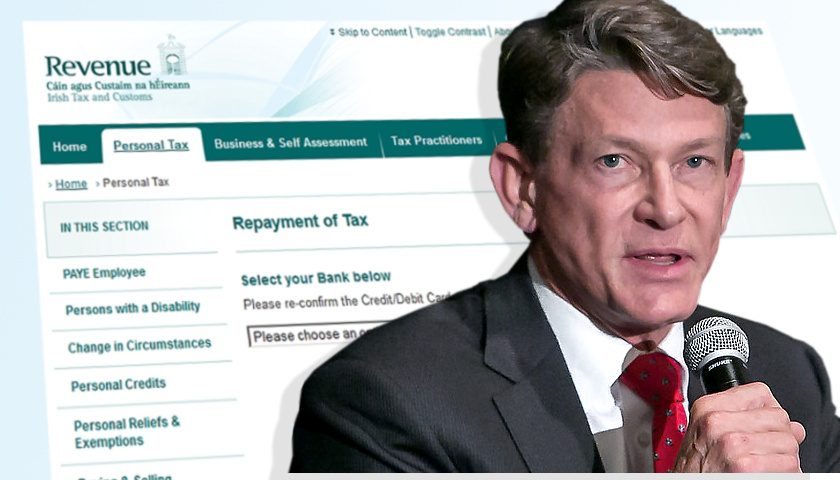The government of Ireland has confirmed to The Tennessee Star that the Irish tax records cited in a recent Tennessean article about the Irish subsidiary of GOP gubernatorial candidate Randy Boyd’s company are private, and not available to the public or the media through legal means.
Ms. Leann O’Kelly, Press & Media Manager for Ireland’s Revenue Commissioners, the body in the Irish government that addresses tax matters has confirmed that tax records of “any individual, company or entity,” are not available to the public or the media and that “Revenue is legally precluded from providing public comment on the tax affairs of individuals or entities.”
The Tennessean newspaper reported earlier in the month that the Irish subsidiary (PetSafe Ireland) of Radio Systems Corporation, the company founded and majority controlled by Republican gubernatorial candidate Randy Boyd, is a tax haven that enables Boyd’s Knoxville-based company to significantly diminish its U.S. tax obligations.
However, The Tennessean failed to publish, produce, or explain the legal provenance of the alleged unverified tax documents upon which its story relies, despite a direct request from The Star.
The claim made by The Tennessean, therefore, in the headline of the article, “How Randy Boyd’s company avoided millions in taxes,” is unproven and unsubstantiated.
News that the Irish government is not the source of the alleged tax document cited, but not produced, in The Tennessean article, raises a number of troubling legal questions for the Gannett Company, the publicly traded mainstream media giant that owns The Tennessean and the USA Today Network – Tennessee.
- Is the unproduced alleged tax document genuine?
- Was the unproduced alleged tax document procured illegally from Boyd’s company?
- If so, did The Tennessean know the unproduced alleged tax document was procured illegally from Boyd’s company?
- If The Tennessean believed the unproduced alleged tax document it secured and provided to two experts for analysis was obtained legally, why did it fail to publish the document for public review?
- If The Tennessean published an article based on an alleged tax document that the government says is not legally available to the media, has it violated any law in doing so?
The Tennessean headline from that story is featured in a new ad by Boyd’s rival for the GOP gubernatorial nomination, Rep. Diane Black (R-TN-06).
“Randy Boyd raises our taxes, and doesn’t pay his,” that ad concludes.
Like The Tennessean story featured in the ad, however, that claim is entirely unsubstantiated.
As The Star reported previously, Boyd and his wife Jenny released their 2015 and 2016 personal income taxes for public review in December. Those records show that they personally paid more than $8.5 million in federal and state taxes on $30 million in taxable income over that two year period.
The Star contacted Ireland’s Revenue Commissioner’s spokesman and asked the following questions:
A recent newspaper story alleges that Boyd’s private company PetSafe Radio System’s “Irish tax records” were obtained by a Tennessee newspaper (not The Tennessee Star) and which then had them analyzed by tax experts.
The paper has not to date, published the tax records. In the U.S. a privately held company’s tax records are not often nor easily obtainable without their consent.
Can you please tell me whether the PetSafe Radio System Corporation’s Irish tax records are open to the public? If so, is there a process by which to request copies?
If not, how could a U.S. newspaper have obtained the records if the company did not provide the copies or consent?
Ms. Leann O’Kelly, Press & Media Manager for Ireland’s Revenue Commissioners, the body in the Irish government that addresses tax matters promptly responded:
I would like to explain that Revenue safeguards and respects taxpayer confidentiality. The provisions of section 851A of the Taxes Consolidation Act, 1997, formalise taxpayer confidentiality and provide a specific tax-related provision to assure taxpayers that their personal and commercial information disclosed to Revenue for tax purposes is protected against unauthorised disclosure to other persons. This means that Revenue cannot provide you, or any other third party, with the tax record of any individual, company, or entity. It also means that Revenue is legally precluded from providing public comment on the tax affairs of individuals or entities.
Immediately following The Tennessean’s story, The Star contacted University of California-Irvine School of Law professor Omri Marian, an expert consulted by The Tennessean whose analysis of the alleged tax documents was part of the newspaper’s story.
Professor Marian answered the following questions for The Star with regard to the alleged tax documents:
1.Can you confirm that the Irish tax records for Radio Systems Corp you analyzed were provided to you by the USA Today Network-Tennessee?
Response: I can confirm it was provided to me by David Boucher, who introduced himself as a reporter with the Tennessean (a fact I confirmed with a quick online research).
- Are you confident those records are authentic Irish tax records for Radio Systems Corp?
Response: I had no reason to doubt the authenticity of the documents I received from Mr. Boucher.
- Based on your knowledge of Irish law, do you believe USA Today Network-Tennessee obtained those tax records through legal means?
Response: I do not know how Mr. Boucher obtained the documents.
- Can you provide us with a copy of the Irish tax records of Radio Systems Corporation you analyzed?
Response: I suggest you reach out to Mr. Boucher directly for the documents.
At the same time The Star contacted Mr. Boucher, author of the article in The Tennessean, and asked him if the Boyd Irish tax records were obtained legally from public records, but did not receive a response.
In contrast to The Tennessean, The Star’s reporting on Randy Boyd’s business and political record has been entirely based on publicly available, documented facts.
For example, The Star’s report that Boyd donated $250,000 in 2016 to Conexion Americas, the Nashville-based organization headed by Renata Sota, chairman of the national George Soros-funded group formerly known as La Raza, was based on this statement made by Soto in this September 2016 email to supporters and donors of Conexion Americas:
Dear friend,
I can’t think of a better way to kick off Hispanic Heritage Month today than with sharing this news about Randy and Jenny Boyd’s historic investment in the expansion of Conexión Américas’ lauded culinary incubator and entrepreneurship program. Their $250,000 donation represents the single largest individual gift to Conexión Américas in our 14-year history. (emphasis in original)
The $250,000 donation by Randy and Jenny Boyd was also confirmed in the 2015-2016 annual report of Conexion Americas, as The Star reported.





Who cares ?
So the Gannett chain-gang is passing off fake news as a “gotcha” La Raza Randy moment. How predictable is that? And how far the Nashville Tennessean has fallen from its Pulitzer Prize-winning days.